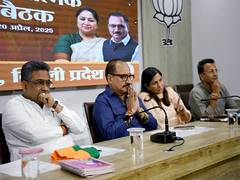Main aim of public audit is not fault finding, but improving processes, policies: President Murmu
Shimla (Himachal Pradesh) [India], April 19 (ANI): President Droupadi Murmu said here on Wednesday that the primary objective of an audit should be to improve processes and policies rather than to find faults.
She was interacting with officer trainees of the Indian Audit and Accounts Service during her visit to the National Academy of Audit and Accounts, Shimla. “The primary objective of the audit should be to improve the processes and policies rather than to be a fault-finding exercise. Therefore, it is essential to communicate the audit recommendations with clarity and conviction. This will help reform and refine the public services and their delivery for the maximum benefit of the citizens,” said President Murmu, according to a press release by the Rashtrapathi Bhavan.
The president urged Indian Audit and Accounts Service officers to always keep in mind the well-being of the citizens of the country and ensure fairness in their approach.
Addressing the officer trainees, the President said that it is a matter of pride for them to have the opportunity to enforce principles of accountability and transparency as officers of the Comptroller and Auditor General (CAG) and the Indian Audit and Accounts Department. She said that the role of the supreme audit institution is not just limited to providing oversight but also to provide necessary inputs to informed policy making.
The CAG through the Indian Audit and Accounts Department and its able officers has been effectively pursuing both these objectives. It is incumbent upon them to continue to uphold the ideals of the Constitution and work with integrity and commitment towards nation-building.
Speaking about digitising the audit process, the President said that the recent launch of the One Indian Audit & Accounts Department One System is a praiseworthy initiative. Technologies such as blockchains, data analytics, virtual audit rooms etc. can be used widely to ensure transparency and compliance. But technology cannot and should not replace the need for human intervention. She urged young officers to understand the value of the human touch and sensitivity towards issues concerning the nation and its citizens while taking decisions and implementing policies.






